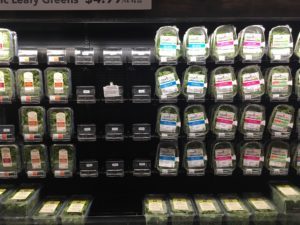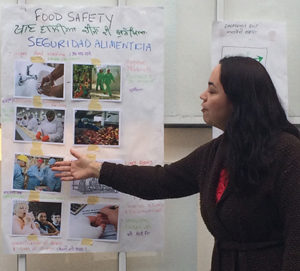 Consumer confidence in food safety was eroding before the recent pre-Thanksgiving scare encompassing all romaine lettuce. In a recent study by the Center for Food Integrity, only a third of survey respondents in 2018 “strongly agree” that they are confident in the safety of the food they eat, a significant drop compared to nearly half of respondents (47 percent) in 2017.
Consumer confidence in food safety was eroding before the recent pre-Thanksgiving scare encompassing all romaine lettuce. In a recent study by the Center for Food Integrity, only a third of survey respondents in 2018 “strongly agree” that they are confident in the safety of the food they eat, a significant drop compared to nearly half of respondents (47 percent) in 2017.
This shift in confidence is not surprising. An E. coli outbreak with romaine lettuce in April impacted 36 states and resulted in 96 hospitalizations and five deaths; it was the largest scare since the spinach crisis in 2006. The recent pre-Thanksgiving outbreak has infected 43 people in 12 states to date, resulting in 16 hospitalizations—and national food safety warnings that cleared shelves across the country. Every U.S. grocery shopper likely saw firsthand the bare shelves and signs during one of the busiest food shopping weeks of the year.
When the FDA’s Food Safety Modernization Act (FSMA) was established in 2011, it was referred to as “the most sweeping reform of U.S. food safety laws in more than 70 years.” FSMA included seven major regulations affecting how produce is grown, packed, processed, shipped and imported into the United States. But even with this increased regulation, E. coli made it through the harvest and plant sanitation processes on two separate instances with romaine lettuce this year.
The Center for Science in the Public Interest estimates the greatest number of foodborne illnesses and the largest average number of illnesses per outbreak are caused by fresh produce. Government regulations can only do so much to stop food safety issues with fruits and vegetables.
However, growers have at their disposal a front line of farmworkers who can become change agents in preventing foodborne outbreaks. With the right training, farmworkers can play a critical role in helping prevent a wide range of food pathogens such as E. coli, Salmonella and Listeria from contaminating crops. Increased self-regulation and full participation among growers may be the answer.
 Equitable Food Initiative (EFI) certification provides promising solutions in which workers in every department across the farming operation are trained to identify, mitigate and respond to issues that compromise food safety, including illness, presence of pests or animals, hygiene and sanitation. “We are minimizing risk with EFI by training every set of eyes and pair of hands that we have on the front lines looking for and addressing food safety issues,” stated John Farrington, COO, Andrew & Williamson Fresh Produce.
Equitable Food Initiative (EFI) certification provides promising solutions in which workers in every department across the farming operation are trained to identify, mitigate and respond to issues that compromise food safety, including illness, presence of pests or animals, hygiene and sanitation. “We are minimizing risk with EFI by training every set of eyes and pair of hands that we have on the front lines looking for and addressing food safety issues,” stated John Farrington, COO, Andrew & Williamson Fresh Produce.
“At every stop of that value-added supply chain there is an opportunity for pathogens to get into fruit or vegetables, and it’s the workforce that touches it at each step,” said Kevin Boyle, EFI Director of Business Development. “If we can educate farmworkers around the protocols of food safety and allow them to use the skills, knowledge and experience they already have, they will find places along that supply chain where there is risk and then they will find solutions to mitigate that risk.”
There are many reasons to make food safety a priority, including consumer safety, financial repercussions and brand management. The financial cost of a food safety outbreak can take a toll on any organization. Texas A&M University estimated that, in 2006, farmers lost $12 million in U.S. spinach sales from the deadly outbreak of E. coli. Before it was contained, 227 people had become ill; 104 had been hospitalized; 31 had developed serious complications; and three had died. In 2008, a salmonella outbreak in cantaloupe led to 14 hospitalizations and $5.8 million in lost sales.
A food safety crisis can impact the sales of the entire category, not just one product, one grower or one growing region. The loss in revenue for growers and retailers is immediate, and the entire supply chain feels the impact, often for months to come.
 The week the news broke about the romaine lettuce recall in April 2018, romaine sales fell 20 percent, which pushed total lettuce performance down by double digits: iceberg lettuce sales were down 19 percent; red leaf lettuce sales fell 16 percent; and endive dollar sales dipped 17 percent, according to a Nielsen report on National Salad Month. In May 2018, romaine sales fell nearly 45 percent, according to an article in the Wall Street Journal. Iceberg sales fell 22 percent, and red leaf sales fell 17 percent. Prices for whole heads of romaine lettuce were down 60 percent.
The week the news broke about the romaine lettuce recall in April 2018, romaine sales fell 20 percent, which pushed total lettuce performance down by double digits: iceberg lettuce sales were down 19 percent; red leaf lettuce sales fell 16 percent; and endive dollar sales dipped 17 percent, according to a Nielsen report on National Salad Month. In May 2018, romaine sales fell nearly 45 percent, according to an article in the Wall Street Journal. Iceberg sales fell 22 percent, and red leaf sales fell 17 percent. Prices for whole heads of romaine lettuce were down 60 percent.
The second 2018 romaine advisory broke just two days before Thanksgiving as a bombshell notice from the Centers for Disease Control and Prevention warning consumers not to eat any romaine lettuce. The scope of the cost to growers with millions of pounds of romaine being destroyed will take months to fully document.
Food safety issues like those in spinach, cantaloupe and romaine task scientists, regulators and industry members to evaluate not only what went wrong but also how to fix it. To date, conversations are often about improved monitoring and technology, like better testing, better records and more efficient traceability—all of which are important. But interestingly, little discussion centers on how to create a better trained and prepared workforce.
EFI and EFI-certified growers aim to add workforce development to the food safety discussions. Putting the skills and knowledge of millions of farmworkers to use could presumably stop foodborne outbreaks in the field—before ever reaching a box, a store or a consumer’s plate. EFI Leadership Team training offers a new way to educate farmworkers on issues related to food safety.
“As a company, we know firsthand the realities of a food safety issue. We recognize the need to explore every tool available and make changes in our business—EFI is one of those tools. By relying on the relationships we’ve made through the EFI network, we are able to navigate issues that could have turned into full-blown crises. Bringing together multiple points of view has strengthened our business and our response to a variety of issues—including those related to food safety,” said Ernie Farley, Partner, Andrew & Williamson Fresh Produce and EFI Board Chair.
EFI Executive Director Peter O’Driscoll has this to say: “Let us not stop exploring the best in technology and new ideas for food safety, but let us not disregard the obvious that is related to farmworker training. The overwhelming loss in revenue, not to mention legal damages, due to a food safety outbreak far outweighs the costs associated with elevating farmworkers with increased training and pay for added responsibilities that can save money, business and most important consumer trust in the food supply.”
Learn more about EFI certification and its role in advancing food safety on farms at www.equitablefood.org.

